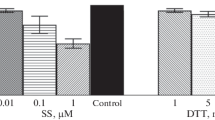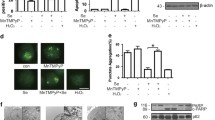Abstract
Selenite-induced oxidative stress and its relationship to mitochondrial apoptosis was studied in human adenocarcinoma HT-29 cells. It is shown that selenite induces caspase-dependent apoptosis, which is mediated by mitochondria via released cytochrome c, apoptosis-inducing factor (AIF) and Smac/Diablo. Selenite activates stress kinases p38 and JNK while suppressing reduced glutathione (GSH) and thioredoxin reductase (TrxR) levels, transiently inducing heme oxygenase (HO-1) system as well as reducing Akt expression. Pre-treatment of cells with selected antioxidants and stress kinase inhibitors significantly prevented selenite-induced cell death, thereby implicating oxidative stress as a direct (Bax) as well as indirect (via kinases) cause of HT-29 cells demise. These results thus demonstrate for the first time active proapoptotic and anti-survival effects of selenite in colon cancer cells.
Similar content being viewed by others
References
Harrison P.R., Lanfear J., Wu L., Fleming J., McGarry L., Blower L., Chemopreventive and growth inhibitory effects of selenium, Biomed. Environ. Sci., 1997, 10, 235–245
Rikiishi H., Apoptotic cellular events for selenium compounds involved in cancer prevention, J. Bioenerg. Biomembr., 2007, 39, 91–98
Brenneisen P., Steinbrenner H., Sies H., Selenium, oxidative stress, and health aspects, Mol. Aspects Med., 2005, 26, 256–267
Clark L.C., Combs G.F. Jr., Turnbull B.W., Slate E.H., Chalker D.K., Chow J., et al., Effects of selenium supplementation for cancer prevention in patients with carcinoma of the skin. A randomized controlled trial. Nutritional Prevention of Cancer Study Group, JAMA, 1996, 276, 1957–1963
Meuillet E., Stratton S., Cherukuri D., Goulet A.-C., Kagey J., Porterfield B., et al., Chemoprevention of prostate cancer with selenium: An update on current clinical trials and preclinical findings, J. Cell. Biochem., 2004, 91, 443–458
Zeng H., Davis C.D., Down-regulation of proliferating cell nuclear antigen gene expression occurs during cell cycle arrest induced by human fecal water in colonic HT-29 cells, J. Nutr., 2003, 133, 2682–2687
Jonsson-Videsater K., Bjorkhem-Bergman L., Hossain A., Soderberg A., Eriksson L., Paul C., et al., Selenite-induced apoptosis in doxorubicin-resistant cells and effects on the thioredoxin system, Biochem. Pharmacol., 2004, 67, 513–522
Li S., Zhou Y., Wang R., Zhang H., Dong Y., Ip C., Selenium sensitizes MCF-7 breast cancer cells to doxorubicin-induced apoptosis through modulation of phospho-Akt and its downstream substrates, Mol. Cancer Ther., 2007, 6, 1031–1038
Zhong W., Oberley T.D., Redox-mediated effects of selenium on apoptosis and cell cycle in the LNCaP human prostate cancer cell line, Cancer Res., 2001, 61, 7071–7078
Yu R.A., Yang C.F., Chen X.M., DNA damage, apoptosis and C-myc, C-fos, and C-jun overexpression induced by selenium in rat hepatocytes, Biomed. Environ. Sci., 2006, 19, 197–204
Zhu Y., Xu H., Huang K., Mitochondrial permeability transition and cytochrome c release induced by selenite., J. Inorg. Biochem., 2002, 90, 43–50
Huang F., Nie C., Yang Y., Yue W., Ren Y., Shang Y., et al., Selenite induces redox-dependent Bax activation and apoptosis in colorectal cancer cells, Free Radic. Biol. Med., 2009, 46, 1186–1196
Song G., Ouyang G., Bao S., The activation of Akt/PKB signaling pathway and cell survival, J. Cell. Mol. Med., 2005, 9, 59–71
Rudolf E., Kralova V., Cervinka M., Selenium and colon cancer—from chemoprevention to new treatment modality, Anticancer Agents Med. Chem., 2008, 8, 598–602
Wang H., Yang X., Zhang Z., Xu H., Both calcium and ROS as common signals mediate Na2SeO3-induced apoptosis in SW480 human colonic carcinoma cells, J. Inorg. Biochem., 2003, 97, 221–230
Zhou N., Xiao H., Li T.K., Nur-E-Kamal A., Liu L.F., DNA damage-mediated apoptosis induced by selenium compounds., J. Biol. Chem., 2003, 278, 29532–29537
Stewart M.S., Davis R.L., Walsh L.P., Pence B.C., Induction of differentiation and apoptosis by sodium selenite in human colonic carcinoma cells (HT29), Cancer Lett., 1997, 117, 35–40
Kim Y.S., Jhon D.Y., Lee K.Y., Involvement of ROS and JNK1 in selenite-induced apoptosis in Chang liver cells, Exp. Mol. Med., 2004, 36, 157–164
Li G.X., Hu H., Jiang C., Schuster T., Lu J., Differential involvement of reactive oxygen species in apoptosis induced by two classes of selenium compounds in human prostate cancer cells, Int. J. Cancer, 2007, 120, 2034–2043
Wang H.T., Yang X.L., Zhang Z.H., Lu J.L., Xu H.B., Reactive oxygen species from mitochondria mediate SW480 cells apoptosis induced by Na2SeO3, Biol. Trace Elem. Res., 2002, 85, 241–254
Zeng H., Botnen J.H., Johnson L.K., A selenium-deficient Caco-2 cell model for assessing differential incorporation of chemical or food selenium into glutathione peroxidase, Biol. Trace Elem. Res., 2008, 123, 98–108
Han B., Wei W., Hua F., Cao T., Dong H., Yang T., et al., Requirement for ERK activity in sodium selenite-induced apoptosis of acute promyelocytic leukemia-derived NB4 cells, J. Biochem. Mol. Biol., 2007, 40, 196–204
Ranawat P., Bansal M.P., Decreased glutathione levels potentiate the apoptotic efficacy of selenium: possible involvement of p38 and JNK MAPKs—in vitro studies, Mol. Cell. Biochem., 2008, 309, 21–32
Lin A., Activation of the JNK signaling pathway: breaking the brake on apoptosis, Bioessays, 2003, 25, 17–24
Park H.S., Park E., Kim M.S., Ahn K., Kim I.Y., Choi E.J., Selenite inhibits the c-Jun N-terminal kinase/stress-activated protein kinase (JNK/SAPK) through a thiol redox mechanism, J. Biol. Chem., 2000, 275, 2527–2531
Zou Y., Niu P., Yang J., Yuan J., Wu T., Chen X., The JNK signaling pathway is involved in sodium-selenite-induced apoptosis mediated by reactive oxygen in HepG2 cells, Cancer Biol. Ther., 2008, 7, 689–696
Liu B., Chen Y., St Clair D.K., ROS and p53: a versatile partnership, Free Radic. Biol. Med., 2008, 44, 1529–1535
Gayet J., Zhou X.P., Duval A., Rolland S., Hoang J.M., Cottu P., et al., Extensive characterization of genetic alterations in a series of human colorectal cancer cell lines, Oncogene, 2001, 20, 5025–5032
Anguiano-Hernandez Y.M., Chartier A., Huerta S., Smac/DIABLO and colon cancer, Anticancer Agents Med. Chem., 2007, 7, 467–473
Author information
Authors and Affiliations
Corresponding author
About this article
Cite this article
Králová, V., Červinka, M. & Rudolf, E. ROS mediate selenite-induced apoptosis in colon cancer cells. cent.eur.j.biol. 5, 166–177 (2010). https://doi.org/10.2478/s11535-010-0007-3
Received:
Accepted:
Published:
Issue Date:
DOI: https://doi.org/10.2478/s11535-010-0007-3




